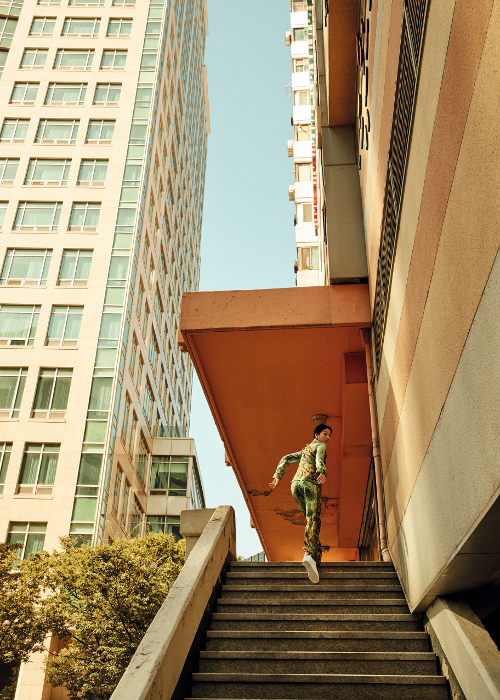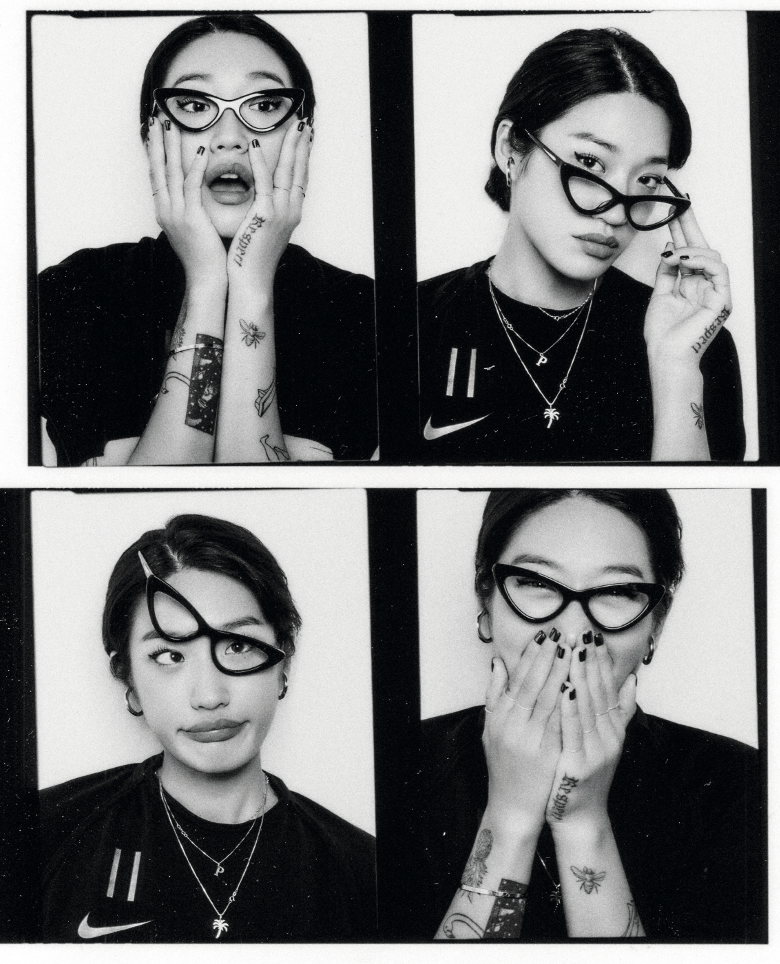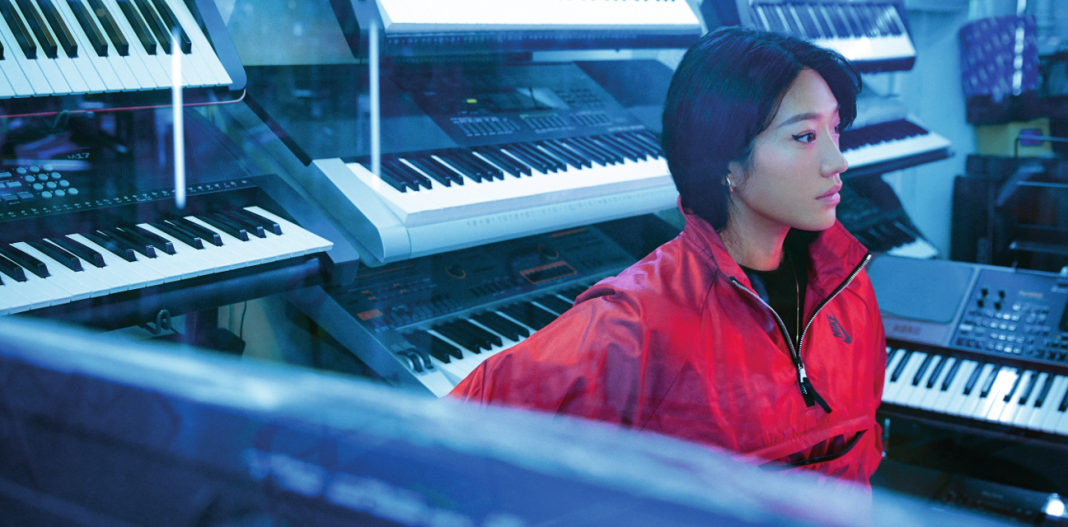All photos: Jungwook Mok (Peggy Gou)
In 2015, she played four gigs. Nowadays, she does 20 per month. No DJ has more dedicated followers than Peggy Gou. At her shows, fans compete for the 27-year-old South Korean’s attention. And not only them: fashion brands and carmakers all want a piece of her. Here, arguably the most fascinating yet polarising newcomer on the house scene lets loose on her determination, Instagram, the relationship between music and fashion – and the art of war.
A bright red tracksuit made from satin is the kind of outfit that makes you stand out, even in London’s hip Shoreditch area. The outfit suits Peggy Gou – not just because she loves extravagant clothes, but because it perfectly mirrors her chipper character. She welcomes me with a hearty squeeze and an impish smile. “I hope you come up with good questions,” says the South Korean musician. “But no worries, I talk a lot anyway.”
As an icebreaker, I ask the Berliner-by-choice what brings her to London this time around; only last week, she was in town for a chill-out DJ set that was live-streamed by Resident Advisor. “Psst,” Peggy whispers secretively. “It’s not official yet, but…” She reveals that tomorrow she will scoop the trophy for Independent Track of the Year at the AIM Independent Music Awards. “I have never won an award before,” Peggy says, evidently buzzing. “Well, only once, for not missing any days in school. Wait, shall I tell that story when I receive the award?”
The 27-year-old is in good company: the previous three winners in this category were FKA twigs, Adele and The xx. Astonishingly, when the award was handed out for the first time, in 2015, Peggy was not known as a musician or DJ at all. Apparently, she only played four DJ gigs that year. With the release of her debut EP in January 2016, that changed rapidly. It also kicked off a career that, arguably, is unparalleled in electronic dance music today. Just take a look at this summer’s headlines about her in well-established music magazines and on fashion blogs – and that doesn’t include coverage about the 20 regular DJ gigs she plays per month.
Peggy Gou features on FIFA 19 soundtrack
Peggy Gou attends London Fashion Week
Peggy Gou launches fashion line
Peggy Gou launches music label
Peggy Gou joins the line-up for BBC Radio 1’s Residency
Peggy Gou plays UN Women fundraiser
Peggy Gou attends Mulberry fashion event in Seoul
Peggy Gou plays Desperado’s ‘world’s deepest pool party’ in Venice
Peggy is everywhere – and everybody wants a piece of her. In February, she was on the cover of Mixmag. The feature’s headline was „Welcome to the age of Gou-mania“. Here in London, Gou-mania is already in full effect. It’s a three-minute walk from her hotel to Shoreditch House, the venue she has chosen for our interview. Three minutes in which Peggy is greeted by two strangers. “Hey, Peggy Gou!” one of them, a young man with a mop of curly hair, shouts as he passes. A few others clearly recognise her – you can tell by their excited looks and whispers. Does she notice that? Does she like it? “I don’t know what’s going on at the moment,” she says, chuckling. It’s a chuckle that expresses bafflement and excitement in equal measure.

So, how did she go from an unknown to an award-winning producer and festival-headlining DJ in just three years? It makes you wonder: who was Peggy Gou pre-2016? And how does she manage the balancing act of being appreciated by techno veterans and Instagram kids alike? All these questions will be answered over a glass of green juice and ginger shots.
To get to the bottom of the Peggy Gou phenomenon, we need to go back to 2011; back to when she studied fashion in London and a friend gave her a copy of Fatty Folders, the just-released album by Frankfurt-based producer Roman Flügel. According to Peggy, the album changed her life. Enthusiastically, she describes the record’s wealth of detail and complexity, ranging from techno to ambient, from house to IDM. “I was like, ‘Wow, what is this music?’ I googled him and listened to every track he ever put out,” she remembers. “I’m a real nerd when it comes to music.”
Before she discovered Fatty Folders, you’d meet Peggy Gou at semi-posh R’n’B and hip-hop nightclubs around town. Her initial contact with club culture happened a few years earlier, when she still lived in Seoul. Her first boyfriend was an EDM DJ who taught her the basics of DJing. Inspired by Flügel’s music, she started record-shopping at Phonica. She discovered new artists and London’s underground clubs such as Plastic People via Resident Advisor. “My hobby was finding good parties for me and my friends – I was obsessed,” she says. In the green room at Corsica Studios, she met Esa Williams, a South African DJ and producer based in London. They got along well and stayed in touch. Noticing Peggy’s regular posts about the records she bought at Phonica, Esa asked if she had ever considered making music herself.
It seems like an obvious idea. Most record collectors have toyed with the idea of playing their vinyl publicly. Most DJs have toyed with the idea of creating tracks themselves. The difference in Peggy’s case is that she doesn’t toy with ideas, she makes them happen. Several times during the interview, she describes herself as a nerd; as someone who falls head over heels in love with a topic that fascinates her. No compromise. That’s what happened when she discovered music production: there was no longer room for a career as a stylist. “I love styling myself, so I thought, ‘I want to be a stylist.’ But then I realised, ‘I’m not good at styling other people.’”
Was that a tough realisation?
No. There wasn’t a point where I was like, ‘What am I going to do next?’ When music happened, I realised, ‘Fuck, I’m not good at styling. This is what I want to do.’ There was no gap, no desperation.
But aren’t these phases of letting go and re-orientating important?
A lot of people don’t know when to let go. I don’t spend too much time trying to make something happen if I realise it’s not a thing I can be very good at – the best, potentially. If I love something, I’m a very fast learner. Maybe that’s a Korean thing.

While her parents still thought they’d be paying for her stylist training, Peggy spent all her money on software courses and worked at Williams’ recording studio. As for the music she produced at the time, her approach seems oddly logical, considering her discipline and determination. Whereas most young producers try to emulate their favourite tunes when they start working with software, for Peggy Gou the search for her own musical voice was pivotal from the get-go. Instead of typical synth sounds, she used samples of traditional Asian string instruments such as the gayageum and the koto on her early tracks. An example can still be found on YouTube under the pseudonym Peggy Gould; „Hungboo“ features twittering birds, muffled koto chords, Korean phrase singing and heavy dub bass – and has a very peculiar video in which a man dances in elaborate costumes in front of a white canvas. The man, she mentions casually, is Yoo Ah-in, her best friend and South Korea’s answer to Johnny Depp. Wait, Peggy… you got a national film star to appear in your first music video? “Before people knew me as a DJ in Korea, I used to be… it’s weird for me to say… a bit more celebrity,” she says. “I used to be more famous for fashion. I used to do a TV show. It was stupid. I called myself Peggy Gould. Later, I took ‘ld’ off, because I wanted to keep my name but try new things.”
When quizzed on the subject of her TV show, Peggy seems oddly insecure all of a sudden. It’s not that she regrets that part of her career or that she wants to keep it secret, not at all. It’s the prejudice toward her interest in fashion that makes this a touchy subject. Opinions like “If you want to be taken seriously in the scene, you must not show a sense of fashion,” and “Techno and colours don’t match”. She’s been confronted with these sentiments a lot in Berlin, her home since 2014. “When I first started DJing, I wanted to look as serious as possible. I used to dress up in just a white T-shirt and denim,” Peggy told Mixmag. “But now I know fashion is just part of me. Today I’m like, ‘Sorry, mate! I’d rather see a DJ with a sense of style than one who is just wearing black.’”
Video: Peggy Gould feat. Yoo ah-in – Hungboo (ㅎㅎㅎ)
Back then, she spent most of her weekends at Panorama Bar. It used to be her school, she says; a place where she learnt how to build a DJ set and take the audience on a musical journey. In an interview in 2016, Peggy stated that she wanted to be the first South Korean DJ ever to play the legendary club. Just a few months later, she had achieved that goal. It was her outstanding track selection, the support of colleagues such as Jackmaster, and her excellent debut EP Art Of War that laid the foundations for her rapid rise. The EP’s title is an homage to a book by ancient Chinese military strategist Sun Tzu, and also Peggy’s mission statement: ‘Here I come, get ready!’ On Art Of War, the koto sounds from her early work make room for washed-out synthesiser sounds, house beats, jazzy chords and functional arrangements.
One of her demo tracks was turned down by her first label, “because he thought I had sampled too much from a D-Train track,” she says, very candidly. “So I gave it to the people at Phonica and they released it.” That’s another aspect that sets Peggy apart from many of her peers: coolness is not her thing. She doesn’t have a problem admitting that the track was rejected by the label. Or that she actually still enjoys Solomun’s over-rinsed remix of Noir & Haze’s „Around“. Or that she gets on certain people’s nerves because she’s constantly asking them for feedback. A year ago, she’d ask Floating Points if she should sing in Korean on her first single for Ninja Tune, „It Makes You Forget (Itgehane)“. The British producer encouraged her to do so, and his advice was spot-on; the melodic house track with Peggy Gou’s cool talk on top was the tune that secured her the AIM Award. There’s a pattern that becomes apparent throughout the interview: many of Peggy’s career choices are reactions to advice from colleagues. Such as:
“And Esa’s like, ‘Peggy, you can’t make house and techno at the same time. Choose!’”
“And my best friends told me, ‘Peggy, you’re more than selfies – share more of your music.’”
“And Mike Huckaby’s like, ‘Peggy, don’t rush anything. You will know when it’s ready.’”
The principle is always the same: advice and reaction, question and consequence. Sure, mentorship has a long tradition in artistry, but in times of lone fighter thinking and dog-eat-dog mentality, asking for help can be interpreted as a sign of weakness in the extremely competitive DJ business. Especially when you’re a young woman.
Video: Peggy Gou – It Makes You Forget (Itgehane)
Peggy has learnt, early on, to use this candour as her strength. And it works for her, because while she receives feedback from house veterans and techno legends, she also gives back. At her DJ sets, she shakes every hand that’s offered to her. She takes photos with and of her audience. She helps out trainspotters with track IDs while she’s playing. And if it gets too hot in the club, she hands out red and blue flashing fans bearing her name.
In return, her fans show their gratitude. It’s become a tradition at Peggy’s gigs that at the end of her set the whole room will chant her name for minutes. Other times, her followers take off their shoes and wave them at her (“Because Gou sounds like shoe”) or throw plush giraffes (her spirit animal) onto the stage. More recently, people have started to battle for Peggy’s attention with elaborate merchandise they’ve created themselves. When asked about this, she takes off her tracksuit top and reveals a Korean football shirt with the words „Have a Gou Time“ above the number on the back – a custom-made gift presented to her by a fan last night. “The first time they chanted my name was after a show in San Diego in 2016, and it’s become crazier ever since,” she says. “My agent, Anna, is like, ‘Peggy, I’ve never seen people do that for a DJ. They travel so far to see you, to feel connected with you.’”
Why is that? Well, it’s surely rooted in Peggy’s approachability. In a sense, she’s the antitheses of your traditional underground DJ who wears a mask or plays in the furthest corner of the club in order to make the music – and only the music – the centre of attention. She is also probably the first underground DJ to use her social media without a false sense of shame. Peggy understands that by posting pictures on Instagram of people who welcome her at the club with DIY fan T-shirts, they become part of her universe. She also knows that by sharing stuff constantly – images of new outfits, food, hotel rooms, toy giraffes, record covers – she keeps her name in the public eye. In between these more private moments, we get videos in which Peggy announces her next gig, or snaps from the shoot of her new campaign with Porsche, or the recent gig she played for Desperado. Social capital floating freely.

It goes without saying that this attitude doesn’t go down well with some of her peers, especially the older ones and those who see themselves as club culture’s guardians of traditional values. And there it is again, the old prejudice: „If you want to be taken seriously as a musician, you’re not supposed to post selfies or collaborate with big corporations.“ Generally speaking, this kind of allegation leaves her cold: “You don’t like my photos on Instagram? Just click unfollow.” Recently, though, she was surprised by the reaction of a friend. “He said, ‘Peggy, usually I find your Instagram very annoying, but when you posted that video of yourself playing synthesiser, I was like, wow, I had no idea you play so well.’ And I was like, ‘Um, I have played piano for most of my life, and I was obsessed with Chopin as a teenager.’ I don’t do these videos to show off. I do it because I love it.”
Peggy feels that she wants to post more of these videos on Instagram, showing her skills and talking about her musical influences. Not as a brag, she stresses again, but because these aspects make up a big part of her personality; a part that is often disregarded by her haters due to her selfies and fashion shots. Does that upset her? “Not really,” she says. Because people such as Kerri Chandler and Joe Claussell – individuals who were integral in building the foundations of club music – know that Peggy’s passion for the culture is real. And because she knows what she’s capable of. At the moment, she spends most of her spare time practising the gayageum, as she wants to use the instrument on her debut album, which she’ll start work on early next year. Surely, she could just sample the instrument, I suggest. Her response: “But that’s not enough for me.” Peggy wants more – and she wants the world to know. Her strategy is acknowledgement rather than confrontation. Very much in the spirit of one of the most legendary verses from Sun Tzu’s Art Of War: the greatest victory is that which requires no battle.


![[REWIND 2025]: Clubmusik im Konzertformat: Coldplay oder Keinemusik?](https://groove.de/wp-content/uploads/2025/11/rewind-2025-keinemusik-im-konzertformat-clubmusik-218x150.jpg)

![[REWIND 2024]: Die 10 besten Compilations des Jahres](https://groove.de/wp-content/uploads/2024/12/0FAE8615-AE70-4400-9B47-A8C7C7BEA0E9-218x150.jpeg)
